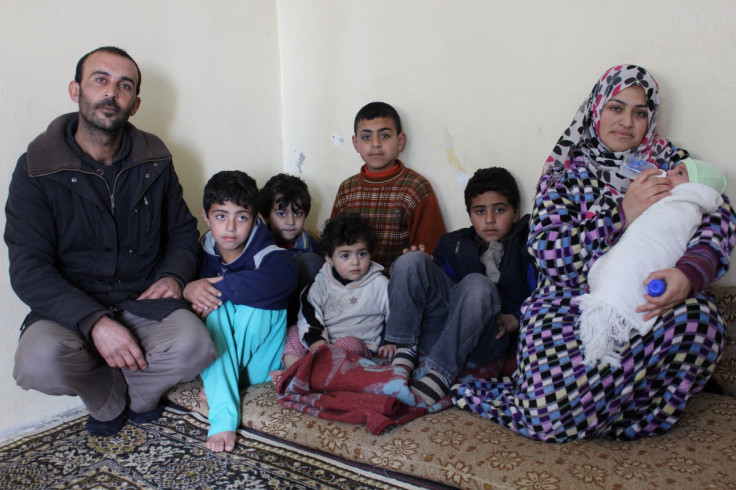Syrian refugee says he will give up his baby if there is no end to hopeless poverty in Jordan

A Syrian refugee and father of six, whose family faces a future of poverty after spending two and a half years living in the Jordanian countryside told IBTimes he may give up one of his children for adoption.
Feisal and his wife Kawthar live in squalid conditions in the Jordanian town of Sakhra in Ajloun. Their 30-day-old baby girl Istabraq lies in the corner of their tiny three room house. While Feisal has opted to rent a home and try to find illegal work rather than live in a camp, he is far worse off than other refugees living in their hundreds of thousands at the nearby Azraq and Zaatari refugee camps.
The price the family is paying to live in Sakhra, and for being free from camp life, where food, shelter and electricity are provided, is enormous. They pay JD80 (£78, $113) each month to rent the house and for basic amenities, but rain leaks into their home: the ceiling is black with mould, a wooden table supporting a TV is disintegrating from the damp: the thin cushions which all the family sleep are wet, and the slim metal chimney that rises from an unlit heater in the centre of the room is brown with rust.
A parent's worst dilemma
The family has lived in the house for six months, but life has been harder since Istabraq was born. Feisal has not been able to find work and was forced to sell one of the family's two gas cylinders. A World Food Programme (WFP) coupon worth JD115 in food was sold for JD80 in cash to pay rent.
Offering one of their children up for adoption could provide Feisal's and Kawthar's family with a better future. Above all Feisal says he wants his children to not suffer and to get an education.
He rails against the unfairness of his situation and feels he has fallen through the cracks of an unjust system of humanitarian assistance. "They all say they are helping but talk is cheap," he told IBTimes UK. "I am scared for my kids' lives," he added.
The cold and damp means his children face respiratory problems. Kawthar wakes up stiff and arthritic in the morning and nearly lapsed into a coma when she was giving birth because of low blood pressure.
The family receives limited assistance from the WFP, and winter provision from the NGO World Vision. His school-aged children receive remedial classes provided by an orphans' charity, but Feisal claimed he was rejected from receiving more help from the UN High Commission for Refugees and was not given an explanation.
Steffen Horstmeier, Response Manager for World Vision in Jordan, told IBTimes UK the cycle of debt was worsening among Syrian refugees in Jordan. "Their savings get used up, the international assistance goes down and then you get these problems."
He said it is also not uncommon for refugees to eschew the Azraq and Zaatari refugee camps despite the safety and security they provide. "I don't think I have seen a Syrian [refugee] who stayed in the same place for more than two years," Horstmeier explained. He added while Azraq refugee camp in particular had been designed to the highest international humanitarian standards, it had no soul."In Azraq you are always safe but you will die of boredom," he said.
No home in Syria, just chaos
"Syrians are eating each other alive to survive," Feisal explains adding that the family receives what little it does from donations from Jordanians. Feisal, who was a handyman in his native Deraa, might expect to make JD5 a day. The amount will not cover costs for the baby and the meagre vegetables the family eats. They have no more savings and Kawthar has sold all of her jewellery to cover the costs of their living.
For Feisal there seems little in Jordan, but he is sure there is nothing left in Syria.
"There is no future in Syria. There is just a mix of chaos. You don't know who is going to kill you – it could be the government, one of the opposition groups or the extremists. Ever since I fled because of the war I said I would never come back," he explained. The family's home was destroyed in recent air raids.
The family's home was destroyed in recent air raids.
The only hope may be resettlement, but Feisal says he has turned down offers to go to Canada and the US for fear of the unknown. "I would be going to place where I didn't know anyone or anything
"I would be going to place where I didn't know anyone or anything in it," he explained.
Callum Paton travelled to the Bekaa Valley in Lebanon courtesy of an NGO
© Copyright IBTimes 2025. All rights reserved.






















